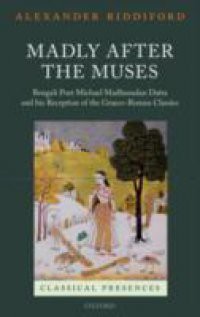Madly after the Muses examines the use of Graeco-Roman samplings in the Bengali works of Michael Madhusudan Datta (1824-1873), the nineteenth-century poet and playwright. His oeuvre, which includes a Bengali play dramatizing a Hindu version of the Judgement of Paris, a retelling of the Sanskrit Ramayana using various Vergilian and Homeric tropes, a Hindu response to Ovids Heroides, and a Bengali prose version of the first half of HomersIliad, utilize the Greek and Roman classics in a surprising and subversive way. Though steeped in contemporary British literary culture, Madhusudans Bengali works bypassed the literary trends of his British contemporaries and, most strikingly, used the Western classics to defy the hegemonic elite culture of the Hindu pundits.He treated traditional Hindu material with innovations inspired by the literature of the Graeco-Roman world, and provided an Orientalist Indo-European reading of the ancient cultures of India and Europe. By subverting contemporary British constructions of what constituted classical, he also highlighted counter-currents within the Western classical discourse. In this volume, Riddiford introduces new texts and contexts to the fields of classical reception and postcolonial scholarship, and includes appendices with translated excerpts from Bengali works not previously translated into English. He also examines the Bengali poets classical education, drawing on new material from various archives to show that he was given a rigorous British-style classical education, offering a surprising early chapter in the story of the dissemination and reception ofthe Graeco-Roman classics in India.

